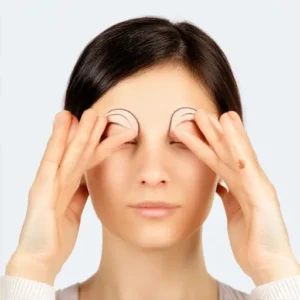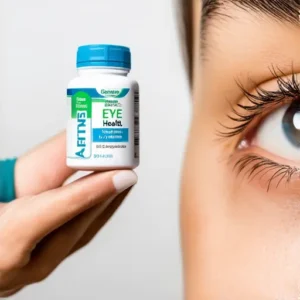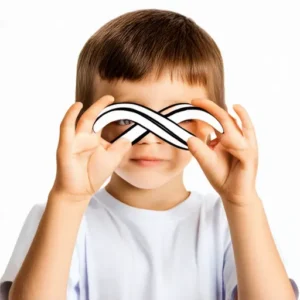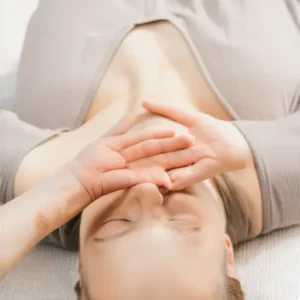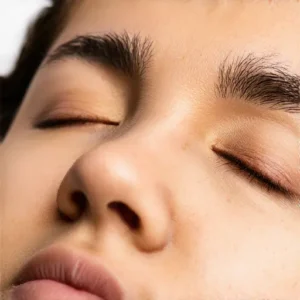Strengthen Your Eyes with These 5 Daily Habits
Introduction: Give Your Eyes the Daily TLC They Deserve
Let’s face it—our eyes are working overtime these days. Between endless Zoom calls, late-night scrolling, and environmental stressors, our vision is taking a beating. But here’s the good news: just a few simple daily habits can strengthen your eyes and keep them healthy for years to come.
Why Eye Health Matters More Than Ever
We’re glued to our screens now more than ever, and our eyes are paying the price. That gritty feeling, occasional blurriness, or nagging headaches? Classic signs of digital eye strain. But protecting your vision isn’t just about seeing clearly today—it’s an investment in your future eye health.
Small Changes, Big Impact
The best part? You don’t need drastic measures to make a difference. Think of it like brushing your teeth—small, consistent habits like eye-friendly foods, simple exercises, and smart screen habits add up to serious protection against conditions like macular degeneration.
What’s Coming Up
In this guide, we’ll walk through five practical ways to strengthen your eyes every day. Whether you’re a screen warrior, bookworm, or just want to keep your vision sharp, these tips will help you see life more clearly.
Feed Your Eyes: Nutrition for Better Vision
You are what you eat—and that goes for your eyes too. The right foods can be like armor for your vision.
Vision Superfoods to Add to Your Plate
Try working these eye-healthy foods into your meals:
- Leafy greens: Spinach and kale pack lutein and zeaxanthin—nature’s blue light blockers.
- Fatty fish: Salmon’s omega-3s are like moisture therapy for dry eyes.
- Nuts and seeds: Almonds and chia seeds offer vitamin E, your eyes’ personal bodyguard against damage.
- Citrus fruits: Oranges give your eye’s blood vessels a vitamin C boost.
Must-Have Nutrients for Eye Health
Keep an eye out for these vision VIPs:
- Vitamin A: Your night vision hero (hello, carrots and sweet potatoes).
- Zinc: The retina’s best friend (beans and oysters are packed with it).
- Beta-carotene: Converts to vitamin A (pumpkin lovers rejoice!).
Don’t Forget to Drink Up
Dehydrated body = dehydrated eyes. Aim for 8–10 glasses of water daily, and maybe go easy on that third cup of coffee.
Eye Gym: Simple Exercises for Stronger Vision
Your eyes have muscles too—and they need workouts just like the rest of you.
Quick Eye Exercises Anyone Can Do
- Palming: Warm your hands and gently cup your closed eyes—instant mini-spa for your peepers.
- Figure eights: Trace imaginary eights to boost eye coordination.
- Near-far focusing: Alternate between close-up and distant objects to give your lenses a workout.
The Golden Rule: 20-20-20
Every 20 minutes, look at something 20 feet away for 20 seconds. It’s like a reset button for your eyes.
Blink—Yes, Really!
We blink less when staring at screens, leaving eyes dry. Make a game of it—full blinks every few seconds keep eyes comfy.
Screen Time Survival Guide
Let’s be real—we’re not giving up our devices. But we can use them smarter.
Blue Light: What’s the Big Deal?
That glow from your screen messes with sleep and may harm retinas over time. Try blue light filters or special glasses—your eyes will thank you at bedtime.
Set Up Your Screen for Success
- Match brightness to your room’s lighting
- Keep screens at arm’s length, slightly below eye level
Break It Up
Pair the 20-20-20 rule with hourly stretch breaks. Your eyes—and your back—will feel the difference.
Beauty Sleep for Your Eyes
Ever notice how your eyes look and feel worse after a bad night? There’s a reason for that.
Why Sleep Is Eye Repair Time
While you’re catching Z’s, your eyes are busy replenishing tears and healing. Aim for 7–9 hours to wake up with fresh-feeling eyes.
Wind Down Right
- Ditch screens before bed (yes, that means your phone too)
- Try a warm compress—it’s like a cozy blanket for tired eyes
Dark Circles Tell a Story
Those under-eye shadows? Often a sign of tired, dehydrated eyes. More sleep and water can work wonders.
Eyewear That Works for You
The right glasses do more than help you see—they protect your eyes too.
Get Your Prescription Right
Annual eye exams aren’t just for new glasses—they catch problems early. And ill-fitting specs? Recipe for eye strain.
Special Lenses Worth Considering
Anti-reflective and blue light-blocking lenses cut glare and filter harmful light—perfect for screen-heavy days.
Sunglasses Aren’t Just for Style
UV protection isn’t optional—it’s essential for preventing long-term damage. Think of sunglasses as sunscreen for your eyes.
Beyond the Basics: Lifestyle Tweaks
Your overall health shows in your eyes—here’s how to give them extra love.
Kick the Habit
Smoking doubles your risk for cataracts and optic nerve damage. One more reason to quit!
Chill Out
Stress can trigger eye twitches and dryness. A little yoga or deep breathing helps more than you’d think.
Don’t Skip Your Eye Exam
Yearly check-ups catch sneaky problems like glaucoma early—when they’re easiest to treat.
Wrapping Up
Your 5-Step Eye Care Routine
- Load up on vision-friendly foods
- Practice eye exercises and the 20-20-20 rule
- Be screen-smart with breaks and filters
- Prioritize sleep and hydration
- Rock the right eyewear and get regular check-ups
Your Eyes Deserve the Best
Vision is precious—and often taken for granted until problems arise. By making these habits part of your routine, you’re not just strengthening your eyes today, you’re protecting your sight for all your tomorrows. Why not start right now? Your future self will thank you!
Strengthen Weak Eye & Improve Focus Instantly
Introduction: Why Your Eyes Feel Tired (And How to Fix It)
Ever finish a long day staring at screens only to feel like your eyes are begging for a break? You’re not alone. In our digital world, weak eye muscles have become as common as morning coffee runs. Blurry vision, headaches, and that frustrating struggle to focus don’t have to be your normal. The good news? Just like any other muscle, your eyes can get stronger with simple exercises, smarter habits, and the right foods.
Whether you’re a student pulling all-nighters, an office warrior glued to spreadsheets, or just someone who values crisp vision, this guide will help you spot weak eye symptoms and show you exactly how to strengthen them—both for quick relief and lasting improvement.
Weak Eyes Explained: It’s Not Just About Your Prescription
Think of your eye muscles like rubber bands. Leave them tense too long without stretching, and they lose their snap. Weak eyes happen when these muscles get lazy from too much screen time, bad lighting, or never getting a proper workout. Left unchecked, this can lead to digital eye strain, worsening nearsightedness, or even conditions like lazy eye.
Is This You? Telltale Signs Your Eyes Need Help
- Your eyes feel like they’ve run a marathon by 3 PM
- Words on screens play hide-and-seek (blurry one minute, clear the next)
- Switching focus from your phone to the TV feels like an Olympic sport
- Headaches that start behind your eyes after reading
- Eyes that can’t decide if they’re too dry or weirdly watery
Why Stronger Eyes = Sharper Mind
Here’s a cool fact: when your eye muscles work efficiently, your brain doesn’t have to strain to interpret blurry signals. It’s like upgrading from dial-up to fiber optic—everything processes faster, from reading speed to reaction times.
The Real Reasons Your Eyes Are Struggling
Knowing what weakens your eyes is half the battle won.
Modern Life’s Greatest Hits on Your Eyes
- Screen addiction: Our eyeballs weren’t designed for 12-hour Netflix marathons
- Lighting fouls: That dramatic mood lighting? Your eyes hate it
- Couch potato eyes: When was the last time your eyes got actual exercise?
- Fast food vision: Skimping on leafy greens means skimping on eye fuel
- Desert eyes: Not drinking enough turns your peepers into sandpaper
Quick DIY Eye Checkups
Try these kitchen-table tests:
- The Pen Challenge: Hold a pen at arm’s length and slowly bring it to your nose. If it goes blurry before it hits your nose, your eye muscles are waving a white flag.
- The Pirate Test: Cover one eye and read a street sign. Switch eyes. If one eye’s clearly slacking, it’s time for some muscle training.
When to Call in the Pros
If blurry vision sticks around like a bad houseguest or you’re seeing double (and not from cocktails), it’s optometrist time. Could be astigmatism, presbyopia, or other issues needing expert care.
5-Minute Eye Gym: Exercises That Actually Work
No equipment needed—just your eyes and a few minutes.
The 20-20-20 Rule (Your Eyes’ Best Friend)
Every 20 minutes, look at something 20 feet away for 20 seconds. It’s like a mini-vacation for your eye muscles.
Near-Far Focus Drills
- Focus on your thumb about 10 inches from your face
- Snap focus to something across the room
- Go back and forth like you’re watching tennis for 1-2 minutes
The Magic of Palming
Rub your hands together until warm, then gently cup them over closed eyes (no pressure!). Breathe deep for 30 seconds—instant eye spa.
Eat Your Way to Better Vision
Your eyes literally are what you eat.
Vision Superfoods
- Vitamin A: Carrots’ rep is legit—they’re retina rocket fuel
- Vitamin C: Nature’s anti-cataract shield (oranges, bell peppers)
- Omega-3s: Turns your eyes from deserts to tropical lagoons (hello, salmon)
- Zinc: Night vision upgrade (found in nuts and beans)
Eye Buffet Essentials
- Spinach and kale (Popeye knew what was up)
- Fatty fish like salmon and mackerel
- Eggs (the yolk’s where the good eye stuff hides)
- Almonds and chia seeds for crunch with benefits
Water: Your Eyes’ Best Lubricant
Eight glasses a day keeps the dry eye away. Your tears are mostly water—keep the supply coming.
Small Changes, Big Eye Gains
Upgrade your daily habits for lasting results.
Breaking Up With Screens
Try the Pomodoro technique—25 minutes work, 5 minutes looking anywhere but your screen. Your eyes will send you thank you notes.
Setting Up an Eye-Friendly Workspace
Screen at eye level, arms-length away. Lighting should be bright but not like a police interrogation.
Sleep: When Your Eyes Hit the Gym
Those 7-8 hours aren’t just beauty rest—it’s when your eye muscles repair and recharge.
Emergency Eye Relief (Because Sometimes You Need It Now)
Quick fixes for when your eyes feel like they’ve been through a desert storm.
Blink Boot Camp
Blink fast for 10 seconds like you’re flirting, then close your eyes for 20. Repeat three times—instant refresh.
Finger Acupressure
Gently massage your temples and under-eye bones in circles. Feels amazing and boosts circulation.
The Cold Spoon Trick
Chill spoons in the fridge, then place the rounded side over closed eyes. Instant de-puff and cool relief.
Next-Level Eye Training
For those ready to commit to Olympic-level eye health.
Vision Therapy (Physical Therapy for Your Eyes)
Custom exercises from an eye doc can retrain how your eyes work together—game changer for coordination.
Eye Yoga (Yes, It’s a Thing)
Trace figure eights with your eyes, do slow side-to-side scans. Think of it as Pilates for your peepers.
Meditation for Clearer Vision
Stress tightens everything—including eye muscles. Five minutes of mindfulness can loosen the grip.
Wrapping It Up
Stronger eyes aren’t about complicated routines—it’s consistent small wins. Start with the 20-20-20 rule today, add some eye-friendly foods to your next grocery run, and notice how much better your eyes (and brain) feel.
Quick Recap:
- Tired, blurry eyes = weak muscles begging for exercise
- Simple tricks like palming work instantly
- Your plate affects your vision—eat the rainbow
- Small habit tweaks lead to big long-term gains
Which tip are you trying first? Drop us a comment below—we love hearing what works for you!
5 Surprising Tips to Strengthen Vision at Home
5 Surprising Ways to Boost Your Eye Health at Home
Why Your Eyes Need Some TLC (And How to Give It to Them)
Let’s face it – our eyes are working overtime these days. Between endless Zoom calls, binge-watching our favorite shows, and scrolling through social media, our peepers are taking a beating. But here’s the good news: you don’t need fancy gadgets or expensive treatments to keep your vision sharp. With some simple daily habits, you can actually strengthen your eyesight naturally.
Whether you’re battling eye strain, noticing some blurriness, or just want to keep your vision crystal clear as you age, these science-backed tips can help. And the best part? You can start today, right from your couch.
Here’s What We’ll Cover
Get ready to discover:
- The ultimate grocery list for happy eyes
- Quick exercises that feel like a spa day for your eyeballs
- How your lighting might be secretly straining your eyes
- Why sleep is your eyes’ best friend
- Simple lifestyle tweaks with big payoffs
Feed Your Eyes: The Delicious Way to Better Vision
Your eyes are hungry for the right nutrients – and no, carrots aren’t the only food that helps (though they’re definitely on the list!).
Eye-Friendly Foods to Stock Up On
Next time you’re at the store, toss these vision superheroes into your cart:
- Leafy greens: Think of spinach and kale as sunglasses for your cells – packed with protective lutein and zeaxanthin
- Colorful veggies: Carrots and sweet potatoes aren’t just for rabbits – their beta-carotene is vision gold
- Fatty fish: Salmon’s omega-3s are like moisture therapy for dry eyes
- Eggs: The yolks are nature’s multivitamin for your eyes
- Citrus fruits: Oranges give your eyes a vitamin C shield against damage
The Dream Team of Eye Nutrients
These are the MVPs your eyes can’t live without:
- Vitamin A: Your night vision’s best friend
- Vitamin C: The cataract fighter
- Vitamin E: Your eye cells’ bodyguard
- Zinc: The Uber driver that delivers vitamin A where it’s needed
- Omega-3s: The ultimate anti-inflammatory squad
Don’t Forget to Drink Up!
Dehydrated? So are your eyes. Aim for 8 glasses of water daily – your eyes will thank you with fewer dry, scratchy moments. Pro tip: watermelon and cucumber count too!
Give Your Eyes a Workout (No Gym Required)
Just like your biceps, your eye muscles need regular exercise to stay in top shape.
The 20-20-20 Rule: Screen Time’s Worst Enemy
Here’s an easy trick to remember: Every 20 minutes, look at something 20 feet away for 20 seconds. It’s like a mini-vacation for your overworked eyes.
Two-Minute Stress Busters for Your Eyes
Palming: Rub your hands together to warm them up, then gently cup them over closed eyes. Breathe deep and imagine you’re on a beach somewhere – ahhh.
Blinking: When you’re glued to screens, you blink less. Try rapid blinking for 10-15 seconds to give your eyes a moisture boost.
The Focus Game
Hold your thumb about 10 inches from your face and focus on it. Then shift to something across the room. Go back and forth for a minute – it’s like CrossFit for your eye muscles!
Let There Be (The Right Kind of) Light
Bad lighting is like kryptonite for your eyes – here’s how to fix it.
Lighting Hacks for Happy Eyes
Follow these simple rules:
- Position screens to avoid window glare (say no to squinting!)
- Use adjustable lamps for reading – your book club will thank you
- Keep overall lighting soft – think cozy café, not operating room
Sunlight: Friend or Foe?
Natural light is great – in moderation:
- Aim for 1-2 hours outdoors daily (with sunglasses, of course)
- Set up your workspace near a window when possible
- Take “sun breaks” – your eyes and your mood will improve
The Truth About Blue Light
Blue light isn’t all bad, but here’s how to keep it in check:
- Use night mode on your devices
- Consider computer glasses if you’re a screen zombie
- Power down before bed – your eyes (and sleep) will thank you
Beauty Sleep for Your Eyes
Turns out, “sleeping on it” is exactly what your eyes need.
What Happens When Your Eyes Hit the Hay
While you’re catching Z’s, your eyes are busy:
- Making tear fluid (nature’s eye drops)
- Repairing daily wear and tear
- Processing all those memes you scrolled through
The Best Sleep Position for Your Eyes
Sleeping on your back with your head slightly elevated helps:
- Reduce pressure inside your eyes
- Prevent morning puffiness (no more baggy eyes!)
- Keep fluids moving like they should
Sleep Hygiene for Bright Eyes
Try these tweaks for better shut-eye:
- Stick to a regular bedtime (yes, even on weekends)
- Make your bedroom pitch black – think bat cave
- Ditch screens before bed (I know, I know…)
- Use a humidifier if you wake up with desert-dry eyes
Nature’s Eye Drops: Herbal Helpers
Sometimes your eyes need a little extra help from Mother Nature.
Dynamic Duo: Bilberry & Lutein
Bilberry: Like night vision goggles in berry form
Lutein: Your retina’s personal bodyguard against blue light
DIY Eye Soothers
For tired, irritated eyes:
- Chamomile tea bags: Cool them in the fridge first for extra relief
- Rose water: The spa treatment your eyes deserve
- Eyebright herb: An old-school remedy that actually works
Should You Try Supplements?
They might help if:
- Your diet’s missing key eye nutrients
- You have specific eye concerns
- Your eye doctor gives the thumbs up
Small Changes, Big Results for Your Vision
Little tweaks to your daily routine can add up to major eye health benefits.
Breaking Up With Screens
Try these painless ways to cut back:
- The Pomodoro method: 25 minutes work, 5 minutes eye break
- Set app limits (yes, even for Instagram)
- Schedule screen-free activities – remember books?
Why Your Eyes Love the Great Outdoors
Fresh air does wonders for your vision:
- Helps slow nearsightedness in kids
- Gives your distance vision a workout
- Provides the perfect balance of natural light
Stress Less, See Better
Chronic stress can lead to:
- Annoying eye twitches
- Mysterious blurry vision
- Sensitivity to light
Combat it with meditation, deep breathing, or yoga – your eyes will chill out too.
Your Action Plan for Healthier Eyes
The secret to better vision? Consistency with these simple habits.
Quick Recap
- Eat the rainbow (the eye-healthy one)
- Exercise those eye muscles
- Optimize your lighting
- Prioritize sleep like your eyes depend on it (because they do)
- Consider natural helpers when needed
- Make small lifestyle tweaks
Final Thought
Your eyes do so much for you – isn’t it time you returned the favor? Start with one or two of these tips today, and add more as you go. Remember, Rome wasn’t built in a day, and neither is perfect vision!
Have you tried any eye-healthy habits that worked for you? I’d love to hear about them in the comments – let’s swap tips!
Strengthen Retina with These Simple Daily Habits
Simple Daily Habits to Keep Your Retina Strong and Healthy
Your Eyes Deserve Some Love
Think of your eyes as high-resolution cameras—and the retina? That’s the superstar sensor capturing all of life’s moments. When your retina’s in top shape, you enjoy crisp vision, vibrant colors, and seamless transitions from bright sunlight to cozy candlelight. But here’s something most people don’t realize: everyday choices, from what you eat to how you sleep, can either protect or harm this delicate tissue. Whether you’ve noticed slight vision changes or just want to stay ahead of the game, these natural ways to strengthen your retina could be your ticket to lifelong clear sight.
Retina 101: Your Eye’s Powerhouse
That postage-stamp-sized layer at the back of your eye? That’s your retina working overtime—packed with millions of light-sensitive cells (rods for night vision, cones for color) transforming light into the movies your brain watches all day. When it weakens, you might notice blurry spots, struggle with night driving, or face serious conditions like macular degeneration.
Is Your Retina Sending SOS Signals?
- Text looking wavy? That’s not your imagination
- Taking forever to adjust to dim restaurants
- Those annoying “floaters” that dart away when you try to look at them
- Colors appearing washed out
Small Changes, Big Impact
The good news? You’re not powerless. Tiny tweaks to your daily routine can become your retina’s best friends. Let’s dive into the easiest ways to boost retina health without overhauling your life.
Eat Your Way to Better Vision
Your grocery list might be the most powerful vision plan you’ve got. The right foods deliver retina-loving nutrients straight to your peepers.
Retina Superfoods You’ll Actually Enjoy
- Greens that mean business: Spinach and kale aren’t just salad fillers—they’re packed with lutein and zeaxanthin, nature’s blue light blockers.
- Fatty fish: Salmon’s omega-3s aren’t just heart-healthy—they’re like spa treatments for your retina.
- Crunchy helpers: Almonds and sunflower seeds deliver vitamin E, your retina’s personal bodyguard against damage.
The Vision Vitamin Cheat Sheet
- Vitamin A: Your night vision BFF (hello, sweet potatoes and carrots)
- Omega-3s: Macular degeneration’s worst enemy (flaxseeds FTW)
- Dynamic duo: Lutein & zeaxanthin work like internal sunglasses (egg yolks for the win)
Don’t Forget to Hydrate!
Dehydrated? So are your eyes. When you’re not drinking enough, your retina gets less blood flow and nutrients. Keep that water bottle handy—your eyes will thank you.
Eye Gym: Workouts for Your Retina
Yes, your eyes need exercise too! These simple moves boost circulation and keep your retina responsive.
Two-Minute Eye Spa
- Palming: Warm your hands like you’re holding coffee, then gently cup your closed eyes—instant relaxation
- Eye rolls: Slow circles clockwise, then counter—think of it as yoga for your eyeballs
The Screen Time Savior
Staring at spreadsheets all day? Every 20 minutes, pick something 20 feet away and gaze at it for 20 seconds. Your retina will breathe a sigh of relief.
Focus Flexercise
Hold a pen at arm’s length, focus, then slowly bring it toward your nose. Repeat 10x—it’s like weightlifting for your focusing muscles.
Lifestyle Tweaks for Retina Health
Beyond what’s on your plate, these daily habits make or break your retina’s future.
Smoking and Drinking: Vision’s Worst Frenemies
Smoking starves your retina of oxygen, while alcohol washes away protective nutrients. Cutting back? Your eyes will notice before your waistline does.
Beauty Sleep = Eye Repair Time
Those 7-9 hours aren’t just for energy—they’re when your eyes stock up on moisture and repair retinal cells. Consider it overnight eye maintenance.
Screen Smart Strategy
Binge-watching your favorite show? Enable night mode and take stretch breaks—your retina doesn’t need a blue light marathon.
Shielding Your Eyes from Modern Life
Between screens and sunshine, your retina faces daily light assaults. Fight back with these simple protections.
Blue Light Blues
That phone glow isn’t just keeping you awake—it’s stressing your retina. Try amber-tinted computer glasses for late-night scrolling.
Sunglasses That Actually Work
Skip the gas station shades—look for “100% UV protection” labels. Wraparound styles block light sneaking in from the sides.
Tech to the Rescue
f.lux or iOS night shift dial down blue light automatically. Your eyes won’t notice the color change after five minutes.
Why Eye Exams Aren’t Optional
Think of these as physicals for your vision—catching problems while they’re still fixable.
Checkup Cadence
No vision issues? Every 2 years works. Over 40 or have diabetes? Make it yearly—retinal cameras can spot trouble before symptoms appear.
Catch It Early
Conditions like glaucoma are sneaky—regular retinal imaging spots them before permanent damage occurs.
Your Personal Eye Coach
An ophthalmologist can create a custom retina-strengthening plan based on your family history and lifestyle.
Extra Boost: Supplements & Natural Helpers
When diet isn’t enough, these add-ons give your retina extra armor.
Supplement Stars
- Bilberry: Nature’s night vision enhancer
- Zinc: Helps vitamin A do its job better
- Astaxanthin: The antioxidant that laughs at UV damage
Kitchen Cabinet Remedies
Cool chamomile tea bags on closed eyes reduce puffiness while improving circulation—spa treatment on a budget.
When to Sound the Alarm
Sudden flashes, persistent floaters, or curtain-like shadows? Skip Dr. Google and call your eye doctor—stat.
Your Vision Preservation Plan
Protecting your retina isn’t about drastic changes—it’s the small, consistent habits that add up over decades.
Quick Start Guide
- Load up on leafy greens and omega-3s
- Practice the 20-20-20 rule religiously
- Never skip sunglasses (yes, even in winter)
- Hydrate like your retina depends on it (because it does)
Parting Wisdom
Clear vision is one of those things you don’t appreciate until it’s fading. Start these habits today, share them with your screen-addicted friends, and enjoy the world in high definition for years to come. Your future self will look back (clearly!) and thank you.
Why You Should Strengthen Optic Nerve for Better Vision
Your Optic Nerve: The Secret to Lifelong Clear Vision
Imagine your eyes as high-definition cameras – but without a properly functioning optic nerve, it’s like having a faulty cable that ruins the picture. This crucial bundle of nerve fibers is your visual lifeline to the world, and keeping it healthy should be a top priority. Whether you’re noticing subtle vision changes or simply want to protect your peepers for the long haul, learning how to strengthen your optic nerve could be a game-changer. Let’s dive into practical, everyday ways to support this vital connection between your eyes and brain.
Getting to Know Your Optic Nerve
Picture your optic nerve as a superhighway with over a million lanes (nerve fibers, to be exact), all working overtime to deliver visual information from your retinas to your brain. Here’s the catch: unlike some nerves that can repair themselves, severe damage to the optic nerve is often permanent. That’s why prevention is so powerful.
Why Your Optic Nerve Deserves Attention
A happy, healthy optic nerve means crisp, vibrant vision. But when it’s struggling? You might notice blurry spots, visual gaps, or worse. Conditions like glaucoma specifically target this delicate structure, making proactive care non-negotiable for maintaining good eyesight.
Simple, Natural Ways to Boost Optic Nerve Health
The good news? Supporting your optic nerve doesn’t require drastic measures. Small, consistent habits can make a big difference in nourishing those precious nerve cells.
Eat Your Way to Better Vision
Your grocery list might be your optic nerve’s best friend. Load up on these vision superheroes:
- Leafy greens: Spinach and kale come packed with lutein and zeaxanthin – nature’s sunglasses for your nerves.
- Fatty fish: Salmon and mackerel deliver omega-3s that keep nerve communication smooth.
- Bright berries: Blueberries and their colorful friends fight cellular stress with powerful antioxidants.
Give Your Eyes a Mini Workout
Your optic nerve loves gentle exercise just like the rest of you. Try these easy moves:
- Palming: Warm your hands with a quick rub, then cup them over closed eyes for a soothing 1-2 minute break.
- Figure eights: Trace imaginary eights with your eyes to keep those visual pathways flexible.
Smart Habits for Screen-Weary Eyes
Our digital lifestyles aren’t doing our optic nerves any favors. Fight back with:
- The 20-20-20 rule: Every 20 minutes, give your eyes a 20-second vacation by looking 20 feet away.
- Quality sunglasses that actually block UV rays – your future self will thank you.
Common Optic Nerve Challenges (And How to Avoid Them)
Glaucoma: The Silent Vision Thief
This sneaky condition damages the optic nerve through increased eye pressure. Regular check-ups are your best defense – early detection can save your sight.
Optic Neuritis: When Inflammation Strikes
Often linked to autoimmune issues, this painful inflammation reminds us that whole-body health equals eye health. Ditching smoking and managing chronic conditions can help keep it at bay.
Nutrition: Your Optic Nerve’s Best Friend
Must-Have Nutrients for Nerve Support
Don’t overlook these vision VIPs:
- Vitamin B12: Skip this and risk nerve damage – eggs and fortified foods have your back.
- Magnesium: The nerve relaxer found in almonds and bananas.
Small Changes, Big Vision Benefits
Why the 20-20-20 Rule Works Wonders
This simple trick is like a reset button for your optic nerve during marathon screen sessions.
Exploring Treatment Options
Acupuncture for Eyes? The Possibilities
Early research hints at potential benefits for blood flow, though more studies are needed to say for sure.
The Lifetime Payoff of Optic Nerve Care
Investing in your optic nerve today means enjoying sharper vision, fewer headaches, and better protection against age-related eye issues down the road.
Wrapping Up
Your optic nerve works tirelessly behind the scenes to deliver your beautiful world in high definition. By feeding it right, giving it gentle exercise, and practicing smart eye habits, you’re setting yourself up for a lifetime of clear vision. Why not start today? Toss some spinach in your smoothie, try that figure-eight exercise, and finally schedule that eye exam you’ve been putting off. Your eyes – and your optic nerve – will thank you for years to come.
Eye Exercises to Strengthen Eyesight Without Glasses Fast
Can You Really Improve Your Eyesight Naturally—Without Glasses?
Ever found yourself squinting at your phone or struggling to read street signs? You’re not alone. While glasses and contacts are common fixes, what if you could naturally strengthen your eyesight through simple daily habits? The truth is, your eyes are muscles—and just like any other muscle, they respond to exercise and care. From targeted eye workouts to vision-boosting foods, let’s explore how you can sharpen your sight without reaching for those frames.
How Your Eyes Can Get Stronger (Yes, Really!)
Think about it—when you want stronger arms, you hit the gym. Your eye muscles work the same way! Studies show that consistent eye exercises can improve focus, reduce strain, and even slow down vision decline. Now, I’m not saying you’ll ditch your glasses overnight (especially if you have severe myopia), but these techniques can make a real difference in your daily clarity.
Why Our Eyes Struggle in the Modern World
Between endless Zoom calls and late-night scrolling, our eyes take a beating. Poor lighting, nutritional gaps, and digital overload all contribute to blurry vision. The good news? Simple exercises can help by:
- Giving tired eye muscles a much-needed break
- Sharpening your focus like a camera lens
- Boosting blood flow to keep your peepers nourished
Why Glasses Aren’t Your Only Option
While glasses correct vision temporarily, eye exercises tackle the root cause. It’s like physical therapy for your eyes—strengthening them from the inside out for lasting results.
Why Bother Improving Vision Naturally?
Beyond the obvious perk of clearer sight, going the natural route offers some sweet bonuses:
Breaking Up With Your Glasses (A Little)
For mild vision issues, regular exercises might mean reaching for your glasses less often. Imagine reading a menu without that awkward “hold-it-at-arm’s-length” dance!
Say Goodbye to Eye Fatigue
Stronger eye muscles adjust focus faster, so that afternoon blurriness becomes a thing of the past.
Future-Proofing Your Vision
Just like staying active keeps your body young, eye exercises can help slow age-related vision changes.
5-Minute Eye Workouts Anyone Can Do
Ready to give your eyes some TLC? These quick exercises are like a spa day for your sight:
The “Warm Hands” Trick (Palming)
Rub your hands together until they’re toasty, then gently cup them over closed eyes for a minute. Feels amazing after a long screen session!
The 20-20-20 Rule (Screen Time Savior)
Every 20 minutes, look at something 20 feet away for 20 seconds. Your eyes will thank you later.
The Pen Drill (Focus Booster)
Hold a pen at arm’s length, focus on it, then slowly bring it toward your nose. Repeat 10 times—it’s like weightlifting for your focus!
The Lazy 8 (Eye Coordination)
Trace an imaginary sideways 8 (∞) with your eyes. Sounds silly, but it works wonders for smooth eye movements.
Beyond Exercises: Daily Habits for Healthier Eyes
True vision improvement comes from lifestyle changes too. Here’s how to support your eye workouts:
Eat Like Your Eyes Depend On It (Because They Do)
Load up on:
- Carrots & kale (nature’s sunglasses with all that vitamin A)
- Salmon (omega-3s keep your retinas happy)
- Blueberries (tiny antioxidants that protect your peepers)
Screen Smarts
Match your screen brightness to the room, and keep monitors at eye level. Your neck will thank you too!
Water Your Eyes (Literally)
Dehydration leads to dry eyes. Drink up—your whole body (including your vision) runs better when hydrated.
Make It Stick: Long-Term Vision Habits
Consistency is key! Try weaving these into your daily routine:
Blink Like You Mean It
Blink rapidly for 10 seconds, then rest. Simple but effective against dry eyes.
Morning Sun Therapy
Close your eyes and face the morning sun for a few minutes (no staring!). Natural light wakes up your eye cells gently.
Give Yourself an Eye Massage
Gentle circles around your temples and under eyes feel heavenly and boost circulation.
Pitfalls to Avoid on Your Vision Journey
Watch out for these common slip-ups:
Overdoing It
Like any workout, rest is part of the process. Don’t turn eye exercises into a marathon.
Ignoring the Big Picture
Conditions like diabetes affect vision. Always check with your doc about underlying issues.
Skipping Days
Results come from regular practice. Think of it like brushing your teeth—but for your eyes!
Your Burning Eye Questions, Answered
When Will I See Results?
Some notice changes in weeks, but give it 3-6 months of steady practice for full benefits.
Can I Ditch My Glasses Forever?
For mild issues, maybe! But serious conditions still need professional care.
Is This Safe to Try at Home?
Generally yes, but stop if you feel pain or worsening vision—then see your eye doctor stat.
The Bottom Line
Here’s the deal: Natural vision improvement works, but it’s not magic. Combine eye exercises with smart habits, be patient, and you might be surprised by the results.
Final thought: Your eyes work hard for you every day. Why not return the favor? Start small, stay consistent, and enjoy the journey to clearer vision.
How Yoga Can Help Strengthen Eye Nerves
Your Eye Nerves Deserve Some Love—Here’s How Yoga Can Help
They say eyes are the windows to the soul, but let’s be real—they’re also overworked superheroes in our screen-dominated world. Between Zoom calls, endless scrolling, and artificial lighting, our optic nerves take a daily beating. The result? Blurry vision, stubborn eye strain, and that “why do my eyes feel so tired?” sensation by 3 PM.
But here’s some good news: your yoga mat might be the secret weapon your eye nerves crave. Those same poses that ease your back tension can actually help strengthen eye nerves naturally. No fancy equipment or expensive treatments—just ancient wisdom meeting modern eye care.
Why Your Eye Nerves Are Begging for Attention
Think of your optic nerve as the high-speed internet cable connecting your eyes to your brain. When it’s sluggish or damaged, you might experience:
- Text that suddenly looks like it’s underwater (blurry vision)
- That “I’ve read this paragraph three times” focus struggle
- Sunlight feeling like a personal attack (light sensitivity)
- Headaches that start behind your eyes
The kicker? We often ignore these signs until they become constant companions.
What’s Actually Weakening Your Eye Nerves?
Our modern habits are basically a checklist for eye nerve stress:
- Screen marathons – Binge-watching your favorite show? Your optic nerves are binge-straining.
- Fast food diets – Skimping on leafy greens means missing nerve-protecting nutrients.
- Chronic stress – Your “always-on” lifestyle is literally stressing out your eye nerves.
- Time’s natural effects – Like gray hairs, nerve weakening comes with the aging territory.
Yoga: The Ancient Eye Gym You Didn’t Know You Needed
Forget thinking of yoga as just stretching—it’s a full nervous system tune-up. Those mindful breaths and gentle movements? They’re delivering oxygen-rich blood to your optic nerves while melting away tension.
The Science Bit (Made Interesting)
Research shows yoga’s dynamic duo—pranayama (breathwork) and asanas (poses)—work like a spa day for your eye nerves. More oxygen + better circulation = happier nerves. It’s like giving your eyes a mini vacation without leaving your mat.
3 Yoga Superpowers for Your Eyes
- The Relaxation Effect – Tense eye muscles = strangled nerves. Yoga helps both unwind.
- The Movement Magic – Gentle exercises keep nerves flexible and responsive.
- The Breath Boost – Deep breathing is like hitting the refresh button for nerve cells.
Try These 3 Simple Eye Yoga Moves Today
1. Palming – Your Eyes’ Favorite Blanket
Do it:
- Rub your hands together like you’re warming them on a winter day
- Cup them gently over closed eyes (no pressure—think cozy cave, not wrestling hold)
- Breathe deeply for 1-2 minutes (perfect time to mentally escape that inbox)
Why it works: Resets strained nerves and improves circulation. Feels amazing after screen time.
2. Eye Rotations – Like Yoga for Your Eyeballs
Do it:
- Sit tall (no slouching—your eyes deserve good posture too)
- Slowly trace big circles with your eyes (clockwise 5x, then reverse)
- Blink like you’re fluttering butterfly wings between sets
Why it works: Prevents nerve stiffness—think of it as WD-40 for your optic nerves.
3. The Focus Game – Train Your Eyes Like a Pro
Do it:
- Hold a pen at arm’s length (yes, actual arm’s length—no cheating)
- Slowly bring it toward your nose, eyes locked on the tip
- Repeat until you feel like an eye ninja (5-10 reps)
Why it works: Strengthens nerve-brain coordination. Bonus: impresses your optometrist.
Breathe Your Way to Better Eye Health
Those yoga breaths aren’t just for stress relief—they’re delivering oxygen straight to your optic nerves’ doorstep.
Bee Breath (Bhramari Pranayama)
Do it:
- Close your eyes (this one’s better without visual distractions)
- Inhale deeply, then hum “mmmm” on the exhale (channel your inner bumblebee)
- Repeat until you feel vibrations soothing your eye sockets (5-7 rounds)
Why it works: The vibrations literally massage your optic nerves. Science says so.
Skull Shining Breath (Kapalbhati)
Do it:
- Sit tall (imagine a string pulling you up from your head)
- Take a deep breath, then exhale forcefully through your nose while pulling your belly in
- Repeat in quick succession (20-30 reps—you’ll feel the energizing buzz)
Why it works: Floods your eyes with oxygen like nature’s energy drink.
Meditation: The Secret Sauce for Eye Nerve Recovery
That 10-minute meditation isn’t just calming your mind—it’s giving your optic nerves a much-needed break from constant visual processing.
Candle Gazing (Trataka)
Do it:
- Light a candle (scented or unscented—your nerves aren’t picky)
- Gaze softly at the flame (no staring contests—blink when needed)
- Close your eyes and hold the afterimage (like saving a screensaver of the flame)
Why it works: Strengthens nerve pathways while teaching your eyes to focus without strain.
Pro Tips to Supercharge Your Eye Yoga Results
Eat Like Your Eyes Depend On It (Because They Do)
Load up on:
- Kale and spinach – Nature’s nerve armor
- Salmon or chia seeds – Inflammation fighters
- Colorful berries – Like tiny vitamin bombs for your optic nerves
The 20-20-20 Rule (Your Eyes’ Best Friend)
Every 20 minutes, look at something 20 feet away for 20 seconds. It’s like a coffee break for your eyes—simple but revolutionary.
Don’t Make These Eye Yoga Mistakes
- Overdoing it – Gentle consistency beats aggressive straining every time
- Forgetting to breathe – Holding your breath defeats the whole purpose
The Bottom Line
Stronger eye nerves aren’t about drastic measures—they’re about small, consistent acts of care. Whether it’s palming during your afternoon slump or practicing candle gazing before bed, these practices add up to real protection for your vision.
Remember:
- Your eye nerves thrive on oxygen and relaxation—yoga delivers both
- Simple exercises done regularly beat intense routines done occasionally
- Combining movement, breath, and smart habits creates the perfect eye care trifecta
Your future self (with clearer, more comfortable vision) will thank you for starting today. Why not try palming right now? Your eyes will instantly feel the difference.
Quick & Easy Steps to Improve Eyesight at Home
Why Your Eyes Deserve Some TLC (And How to Give It to Them)
Let’s be honest—we don’t think much about our eyes until we’re squinting at menus or rubbing tired peepers after a long screen session. But your vision is precious, and the good news? You don’t need fancy treatments to keep your eyes healthy. Whether you’re battling eye strain, worried about aging vision, or just want to stay sharp-eyed, these simple, natural ways to improve eyesight can make all the difference.
Your Eyes Do More Than Just See
Clear vision isn’t just about reading street signs—it affects everything from your work performance to your safety. Ever gotten a headache after staring at your computer too long? That’s your eyes begging for a break. The right habits can prevent that foggy, tired-eye feeling and keep your vision crisp for years to come.
What’s Messing With Your Vision?
Our modern world isn’t exactly eye-friendly. The main culprits behind blurry, strained vision include:
- Binge-watching your favorite shows (yes, Netflix counts)
- Eating like a college student (where are the veggies?)
- Forgetting sunglasses (UV rays don’t play nice)
- Skimping on sleep (your eyes need rest too!)
- That smoking habit (it’s worse for your eyes than you think)
Nature’s Eye Fixes
Before you resign yourself to stronger glasses, try this: small daily tweaks can seriously boost your eye health. Think of it like yoga for your eyes—simple moves and good fuel can work wonders.
Your At-Home Eye Care Routine
Ready to show your eyes some love? These easy habits pack a powerful punch:
The 20-20-20 Rule: Screen Time’s Best Friend
Here’s a trick your eyes will thank you for: every 20 minutes, look at something 20 feet away for 20 seconds. It’s like a mini-vacation for your overworked eye muscles.
Blink—Yes, Really!
Fun fact: we blink half as much when staring at screens. Set a reminder if you need to—those extra blinks keep your eyes from turning into the Sahara Desert.
Eye Gym: Flex Those Visual Muscles
Try this: hold your thumb close, then focus on something across the room. Back and forth, like reps at the gym. Your eyes will feel more limber in no time.
Eat Your Way to Better Vision
Your grocery list just became your eye’s best friend. These foods are like superfuel for your peepers:
Go Orange for Vitamin A
Carrots aren’t just for rabbits—they’re packed with vision-boosting vitamin A. Mix it up with:
- Sweet potato fries (yum)
- Spinach salads (Popeye knew his stuff)
- Scrambled eggs (breakfast of eye-health champions)
Fish for Omega-3s
Salmon does double duty—great for your heart and amazing for dry eyes. Not a fish fan? Walnuts and flaxseeds work too.
Water: The Original Eye Drops
Dehydrated body = dehydrated eyes. Keep that water bottle handy—your eyes need the moisture.
Smart Habits for Sharp Vision
Little lifestyle tweaks can protect your eyes big-time:
Blue Light Isn’t Your BFF
Night mode isn’t just for looks—it saves your eyes from that sleep-stealing blue glow. Bonus: your future well-rested self will thank you.
Sleep: Your Eyes’ Spa Time
Ever notice how everything looks clearer after good sleep? That’s your eyes getting their beauty rest.
Sunglasses Aren’t Just Accessories
Those UV rays? They’re aging your eyes faster. Rock those shades like your vision depends on it—because it does.
5-Minute Eye Workouts
Give your eyes a quick pick-me-up with these moves:
The Warm-Up (Literally)
Rub your hands together and cup them over closed eyes. Instant cozy relief for tired peepers.
The Focus Drill
Pick a pen, hold it at arm’s length, and slowly bring it to your nose. Repeat until your eyes feel more limber than a yoga instructor.
The Lazy Eight
Trace imaginary figure eights with your eyes. It’s like a dance party for your eyeballs.
Kitchen Cabinet Eye Care
Your pantry holds some secret eye-soothers:
Warm Washcloth Magic
A warm compress is like a spa day for your eyes—5 minutes can melt away strain.
Tea Bag Trick
Used chamomile tea bags (cooled, please) reduce puffiness better than expensive creams.
Cucumber Cliché That Actually Works
Turns out those fancy spa photos got it right—chilled cucumber slices really do refresh tired eyes.
When to Call in the Pros
While these tips help, some signs mean it’s doctor time:
Red Flags to Watch For
- Consistent blurriness (not just when you’re sleepy)
- Headaches that won’t quit
- Struggling to see at night
- Suddenly seeing “floaters” or flashes
Why Check-Ups Matter
Annual eye exams catch problems early—think of them as your vision’s yearly physical.
Natural vs. Medical Help
While home remedies are great, sometimes you need the big guns (glasses, meds, or surgery). When in doubt, check it out.
See the Difference
Better vision starts with simple, consistent care. Try mixing a few of these eye-healthy habits into your routine—your future self will see the benefits clearly (pun intended).
Quick Recap:
- 20-20-20 rule = screen time sanity
- Eat the rainbow (especially orange and green)
- Give your eyes mini-workouts
- Block UV rays and blue light
Over to You: Which of these tips will you try first? Or do you have an eye-care hack of your own? Share your thoughts below—we’re all eyes!
Squinting Makes Vision Better: A Simple Trick for Clearer Sight
Squinting Makes Vision Better: A Simple Trick for Clearer Sight
Ever squinted at a restaurant menu and—poof!—the blurry text suddenly comes into focus? You’re not imagining things. That quick eyelid squeeze actually gives your vision a temporary boost by changing how light hits your eyes. Let’s dive into why squinting sharpens your sight, when it works best, and how to do it without turning yourself into a permanent frown-face. Whether you’re battling tiny font or dim lighting, this natural vision hack can be a real lifesaver.
The Science Behind Why Squinting Works
Squinting isn’t just something you do when you’re confused—it’s your body’s clever way of helping your eyes focus when conditions aren’t ideal. Here’s what’s really happening:
Your Eyes’ Natural Camera Trick
When you squint, you’re basically putting your eyelids on aperture duty. By narrowing the opening, you block scattered light rays that cause blurriness, letting only the cleanest, most focused light reach your retina. It’s like your face is its own Instagram filter—minus the dog ears.
The Magic of the Pinhole Effect
This is where the real vision boost happens. That small opening you create by squinting acts like a camera’s pinhole lens, cutting through vision distortions caused by imperfect corneas or lenses. Eye doctors actually use this principle during exams—they’ll sometimes have patients look through a pinhole device to check for refractive errors.
What the Research Says
Science backs up this squinty superpower. A Journal of Vision study found people with mild vision issues could see up to 30% clearer just by narrowing their eyes. Not bad for a trick that doesn’t cost a dime!
Everyday Moments When Squinting Saves the Day
Forget superheroes—your squint game might be the real hero in these common situations:
Reading the Fine Print (Literally)
Medicine bottle instructions, nutrition labels, that absurdly small contract print—a gentle squint can suddenly make all that tiny text readable by cutting glare and sharpening the focus.
Spotting Faraway Objects
Can’t make out that street sign or recognize your friend across the park? Squinting acts like a temporary zoom lens, enhancing edges and improving contrast.
Seeing Better When Lights Are Low
In dim lighting, squinting does double duty—it reduces light scatter while helping your pupils dilate more effectively. Nature’s night vision hack!
How Squinting Stacks Up Against Other Vision Solutions
Sure, squinting helps in a pinch, but how does it compare to other options?
The Glasses vs. Squint Showdown
Think of squinting like using a band-aid when you really need stitches. It’ll help temporarily, but prescription lenses give you precise, all-day correction.
Quick Fix vs. Long-Term Care
While squinting can bail you out in the moment, it doesn’t solve underlying vision issues. Regular eye exams are still your best bet for lasting eye health.
When to Wave the White Flag
If you’re constantly squinting, getting headaches, or still struggling to see clearly, it’s time to call in the pros—schedule that eye exam!
The Perks of Strategic Squinting
Used wisely, this natural vision trick offers some sweet benefits:
- Instant clarity without the price tag – Your eyelids are the only equipment you need
- Bye-bye glare – Especially handy when you’re squinting into bright sunlight
- Mini eye vacation – Brief squinting sessions can give overworked eye muscles a breather
The Dark Side of Too Much Squinting
Like any good thing, overdoing the squint can backfire:
Headache Central
Hold that squint too long and you might end up with tension headaches from all that facial muscle workout.
Wrinkle Warning
Chronic squinters might notice more “crow’s feet” over time—your face’s way of saying “take it easy!”
Not a Permanent Solution
If you’re squinting more than a suspicious detective in a noir film, it’s probably time for an eye check-up.
Squinting Like a Pro
Want the vision benefits without looking like you’re permanently suspicious? Try these tips:
The Goldilocks Squint
Just a gentle eyelid lowering—no need to go full Clint Eastwood squint here.
The Blink-and-Squint Combo
Mix short squints with normal blinking to keep your eyes happy and hydrated.
Eye Gym
Practice focus exercises to strengthen your eye muscles and maybe rely less on squinting over time.
Squinting Questions You Were Too Squinty to Ask
Will Squinting Ruin My Vision?
Nope, but it might hide vision changes that need real correction.
Help for Astigmatism?
It might temporarily help, but won’t fix the underlying issue.
Why Do Some People Squint More?
Blame it on face shape, light sensitivity, or possibly needing glasses they don’t have yet.
The Bottom Line
While squinting can definitely sharpen your sight thanks to that handy pinhole effect, it’s no substitute for proper eye care. Use this trick when you need it, but don’t skip those regular eye exams. Got any funny squinting-in-a-pinch stories? Drop them in the comments—we’ve all been there!
Why Squinting Improve Vision in Low Light
Why Squinting Helps You See Better in the Dark
You know that moment when you’re squinting at a menu in a dim restaurant or straining to read a street sign at night? Suddenly, things look a bit sharper. It’s not just your imagination – squinting really does give your vision a temporary boost. But why does narrowing your eyes help you see better when the lights are low? Let’s uncover the fascinating science behind this everyday phenomenon and explore when it might signal something more than just a dark room.
The Science Behind Squinting and Clearer Vision
Squinting is like your eyes’ built-in focus enhancer. While it won’t fix vision problems permanently, it acts as a quick fix when lighting isn’t ideal. Here’s the breakdown of what’s really happening when you scrunch up your eyes.
Your Eyes’ Natural Camera Trick
When you squint, you’re essentially doing what photographers do with their camera lenses – narrowing the aperture. By reducing the eye’s opening, you:
- Filter out scattered light that causes blur
- Increase depth of field (making both near and far objects clearer)
- Minimize distortions from minor vision imperfections
It’s why people who need glasses but don’t wear them often squint without thinking – their eyes are trying to compensate.
Why Darkness Makes Us Squint
Here’s something counterintuitive: in low light, our pupils open wider to let in more light, but this actually makes images less sharp. Squinting helps by:
- Cutting glare from nearby light sources
- Reducing that “fuzzy” effect from dilated pupils
- Boosting contrast so objects stand out better
It’s your visual system’s clever way of adapting to challenging conditions.
When Squinting Comes to the Rescue
This natural vision hack helps in more situations than you might realize. Let’s look at some common scenarios where squinting saves the day.
The Midnight Reader’s Trick
Trying to read in poor lighting? Squinting helps because it:
- Dims competing light sources that cause glare
- Makes text appear darker against the page
- Gives your straining eyes a bit of relief
Night Driving Survival Skill
Those blinding headlights coming your way? A quick squint can help by:
- Softening the harsh glare from other cars
- Bringing road signs into sharper focus
- Reducing those annoying light halos
The Distance Vision Boost
If you’re slightly nearsighted, you’ve probably squinted to see something far away. This works because it:
- Compensates for small focusing errors
- Sharpens edges that normally appear fuzzy
- Blocks peripheral light that reduces clarity
The Limits of Squinting
While squinting is a handy short-term fix, it’s not a permanent solution for vision problems.
Why It’s Only a Temporary Fix
That clearer vision comes at a cost:
- It doesn’t actually correct underlying vision issues
- Your eyes get tired from constant muscle tension
- It can lead to headaches and eye strain
The Glasses You’re Not Wearing
If you’re squinting regularly, your eyes might be trying to tell you something important:
- You could need prescription lenses
- Ignoring it might lead to worsening vision
- Eye strain can trigger frequent headaches
When Squinting Does More Harm Than Good
While occasional squinting is harmless, making it a habit can backfire.
The Eye Strain Connection
Constantly squinting can lead to:
- Tension headaches from overworked eye muscles
- Dry, irritated eyes from reduced blinking
- General eye fatigue that makes vision worse
A Sign of Bigger Issues?
While squinting itself won’t damage your vision, needing to do it often might mean you have an uncorrected vision problem that could progress if ignored.
Better Alternatives to Constant Squinting
Instead of relying on squinting, try these more comfortable solutions.
Lighting Hacks for Better Vision
Simple adjustments can make a world of difference:
- Use directed lighting for reading or close work
- Position lamps to avoid glare on screens or pages
- Choose warmer bulb colors for evening use
Vision Aids That Actually Help
Modern solutions beat squinting any day:
- Anti-reflective coatings cut annoying glare
- Special night-driving lenses enhance contrast
- Polarized sunglasses reduce daytime squinting
Giving Your Eyes a Workout
Some simple exercises can help maintain eye health:
- Practice shifting focus between near and far objects
- Try palming (covering closed eyes with your palms) to relax
- Follow the 20-20-20 rule: every 20 minutes, look 20 feet away for 20 seconds
When It’s Time to See the Eye Doctor
Certain signs mean you should schedule an eye exam.
Red Flags for Your Vision
Watch for these warning signs:
- Squinting even in good lighting
- Persistent blurriness at any distance
- Regular headaches after reading or screen time
Conditions That Affect Night Vision
Several eye issues can make low-light vision worse:
- Nearsightedness (making distant objects blurry)
- Astigmatism (causing overall blur)
- Cataracts (creating clouded vision)
- Glaucoma (affecting peripheral vision)
Wrapping Up: To Squint or Not to Squint?
The Bottom Line on Squinting
Squinting helps temporarily by:
- Cutting light scatter that causes blur
- Sharpening your focus
- Improving contrast in dim conditions
But remember – it’s a band-aid, not a cure.
Finding the Right Balance
While squinting is a clever natural adaptation, relying on it too often might mean you need vision correction. Proper lighting, the right eyewear, and regular eye checkups will keep your vision clear and comfortable for years to come.
How often do you find yourself squinting to see better? We’d love to hear about your experiences in the comments!


